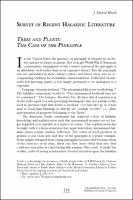Please use this identifier to cite or link to this item:
https://hdl.handle.net/20.500.12202/9337| Title: | Trees and plants: The case of the pineapple. |
| Authors: | Bleich, J David |
| Keywords: | pineapple blessings over foods |
| Issue Date: | 2021 |
| Publisher: | Rabbinical Council of America (RCA) |
| Citation: | Bleich, J. D. (2021). Trees and plants: The case of the pineapple. Tradition, 53(2), 110–145. |
| Series/Report no.: | Tradition: A Journal of Orthodox Jewish Thought;53(2) |
| Abstract: | In the United States the presence of pineapple is ubiquitous on festive and not so festive occasions. Not so in pre-World War II European communities. Immigrants to this country embraced the pineapple as an affordable treat rather than as an expensive luxury. But the pineapple was not embedded in their culinary culture and hence there was no accompanying tradition for its halakhic characterization. Cultivated on relatively low-growing plants, it was simply presumed to be analogous to a vegetable. ¶ Long ago, Socrates declared, “The unexamined life is not worth living.”1 The halakhic counterpart would be “The unexamined foodstuff may not be consumed.” The Gemara, Berakhot 35a, declares that if a person is in doubt with regard to a rule governing blessings he dare not partake of the food in question until that doubt is resolved: “Let him first go to a wise man to teach him blessings so that he not commit me’ilah,” i.e., illicit appropriation of property belonging to the Deity.2 |
| Description: | Scholarly article |
| URI: | https://traditiononline.org/survey-of-recent-halakhic-literature-trees-and-plants-the-case-of-the-pineapple/ https://hdl.handle.net/20.500.12202/9337 |
| ISSN: | Tradition: A Journal of Orthodox Jewish Thought |
| Appears in Collections: | Benjamin N. Cardozo School of Law: Faculty Publications |
Files in This Item:
| File | Description | Size | Format | |
|---|---|---|---|---|
| Bleich-Pineapple-0110-0145.pdf | 344.62 kB | Adobe PDF |  View/Open |
This item is licensed under a Creative Commons License

